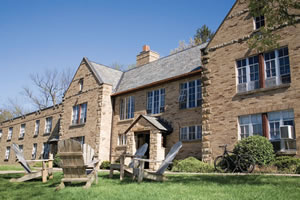Smart Thermostats at Kenyon College

THAT FEELS MUCH BETTER. As one part of an ambitious $7-million energy-conservation project, rooms in six
residence halls on the campus of Kenyon College have been outfitted with smart thermostats, motion and heat sensors
that detect occupancy, and sensors that report open windows. The temperature in a heated room with an open
window drops immediately to 55°F. An unoccupied room with the windows closed drops to 68°F.
Kenyon College is a private liberal arts college
in Gambier, OH, known for being one of
the most beautiful college campuses in the
world. The school has undertaken a number
of sustainability initiatives, including a
recycling system upgrade, a biodiesel project
and the creation of a dining hall composting
system, as well as the distribution of
green living guides for students. Under the
direction of Ed Neal, sustainability director
at Kenyon, students also partnered with
administrators to complete a campus energy
audit for the last three years, as well as a
carbon footprint calculation.
Kenyon is 100-percent residential, with
over 1,800 students living on campus. As
a result of the energy audit performed,
Ed Neal spearheaded a project to retrofit
Kenyon’s residence hall rooms with wireless
energy management technology from
Magnum Energy Solutions. Prior to the retrofit, students had very limited control over
their thermal comfort while in their rooms
and therefore experienced warmer-than-necessary
indoor temperatures. To combat
this, students left windows open nearly
year round, which resulted in wasted energy
and higher bills for the college. The
college tried programmable thermostats,
but these were overly complicated and
students weren’t receptive.
In 2012, the college implemented
wireless, battery-free energy management
technology. Now Kenyon dorm rooms are
equipped with smart thermostats, occupancy
sensors and window sensors that
automate HVAC in the rooms. If a student
opens a window, a wireless signal is sent
and received by the smart thermostat,
which then automatically turns off the HVAC
system. Furthermore, when the student
leaves the dorm, the thermostat receives
a signal from the occupancy sensor and
automatically sets back the HVAC into ecosavings
mode, where it is allowed to drift to
a lower (or higher) set point according to the
college’s preferences.
The new system includes software and
associated access points strategically located
within the TCP/IP infrastructure in the residence
halls, providing the ability to remotely
configure, monitor and control the system.
The dedicated software offers visibility into
energy consumption data in real-time and
control over the maintenance of the system,
and gives the facilities team at Kenyon full
control over the configuration of devices.
The students have completely embraced
the system, which now allows them
to have more control over the temperature
in their residence hall rooms.
“The operation of the system is simple
and straightforward and the installation,
performed by Ameresco, didn’t impact
regular operations at all,” observes Neal, who
also notes an unexpected, yet important
additional benefit. “In the summer months,
dorm rooms were overcooled and the relative
humidity would get high, creating mold
problems,” he says. “With the Magnum
system initiating set backs and thermostat
control, the relative humidity is staying
where it should, between 51 and 54 percent.”
Over the eight-month period that the
technology has been deployed in the initial
400 residence hall rooms, the calculated
energy savings are over $30,000, putting Kenyon
one year ahead of the payback they initially
estimated when the project began. As
a result of the energy savings and improved
resident comfort, the college is expanding
the system into additional residence halls
and academic buildings across campus.
This article originally appeared in the issue of .